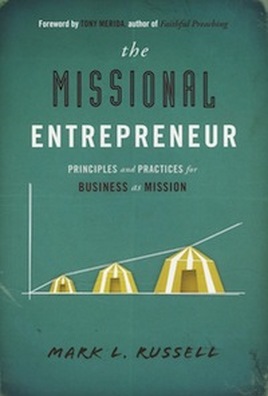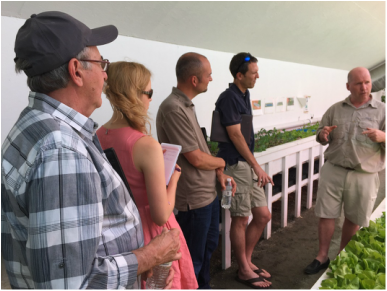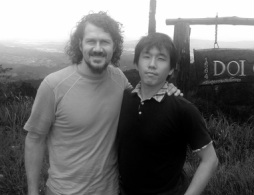|
The Navigator’s calling is simple yet very profound, To advance the Gospel of Jesus and his Kingdom into the nations through spiritual generations of laborers living and discipling among the lost. The last part has an interesting word: “living”. To some this would mean “where you live”, yet I believe it has bigger implications. I believe this word means “your entire life” or “as you live”. If this is the case then we are to be making disciples where we live, where we play, and even where we work. Every part of life. I began my journey of discovering God in the workplace as I was graduating college. Perfect timing. The commands were quite clear in the Bible: to work heartily as unto the Lord and to do everything for the glory of God (Ephesians 6:5-8 and Colossians 3:22-24). The lost were all around me, so I had no problem believing Jesus when he said the harvest was plentiful. The longer I work (which I’ll admit has not been very long) the more God teaches me about following him in every aspect of my life, even work. When I went to the Entrepreneurial Readiness Workshop (ERW) I didn’t really know what to expect. I didn’t have a business idea ready or even have one brewing. Not a feasible one, anyway. Yet I know now that God used that workshop to teach me more about himself. And I don’t have to start a Missional Enterprise to put what I learned into practice! The triple bottom line is foundational to running a successful Missional Enterprise. Yet this same triple bottom line has the ability to inform everyone’s work from a corporate job to an entrepreneurship.
While I don’t know where God is leading me in regards to starting a Missional Enterprise or joining an existing one yet, I am already able to apply lessons from the ERW to my current workplace. How will you bring glory to God in every aspect of your life? GEN Desk Contributing Author and Nav 20s City Leader
0 Comments
“Tom, you’re no longer strange to me.”
What in the world did Ivan, my close friend of two years, mean by that? My wife, our two middle-schoolers, and I had moved into a country that every national who had the chance was fleeing. Food was scarce. Utilities were sporadic. Unemployment was skyrocketing. Corruption was rampant. New criminal gangs were terrorizing the populace as they were fighting each other and carving out their territories. Our move from the suburbs of America to this collapsing country didn’t seem odd to me. It seemed more like an adventure to make a difference in the world by distributing humanitarian aid and leading bible studies with young adults who had never seen a Bible. I met Ivan and his wife on our first day in his country. They were both college graduates and were unemployed. I hired them as our language tutors, our interpreters, and our first employees. We shared life with them for hours on end for 5-6 days a week for two years. The bible studies seemed to be going well. Ivan was translating the materials from English into his native language. Using his artistic ability he also illustrated them with pen and ink drawings. Ivan was a new believer himself so our times in the Word were rich and special for him. I thought I was really connecting with Ivan, so what was that comment about me, “no longer being strange?” After our first 18 months in the country, I changed my focus from humanitarian aid to missional enterprise (BAM). As the enterprise grew we were able to employ more and more people. Job creation took the place of humanitarian handouts. Gainful employment restored dignity and removed the stigma of inferiority. The needs of our enterprise began to create auxiliary enterprises that provided employment for more people. This ripple effect of wealth creation made more sense to Ivan than our previous attempts of propping people up with bailouts. So why did Ivan think I was strange? When I asked him he gave me two reasons:
He also gave me two reasons why I was no longer strange to him:
It makes me wonder how many others have thought of me as strange when I thought I was just trying to help. - Missional Entrepreneur, GEN Desk Contributing Writer
By JACK BENJAMIN
I will never forget the moment 24-years ago when Aldo Berndt, the Latin America Regional Director at that time and a man for whom I have deep respect, made this stunning comment: “It is cruel to talk about the Great Commission in two-thirds of the world.” “How could that be?” I thought to myself. “The Great Commission is the reason my wife and I just moved to Colombia with our three young children!” After Aldo’s bold statement, he saw my distress. So with a gentle smile, Aldo went on to clarify. When fully funded gift-income missionaries launch a new work with the hope of reproducing and sending out laborers, those new laborers often don’t have the funding capacity or time to replicate what the missionary had modeled. The consequence is that future generations of laborers may become discouraged and end up giving the work of the ministry to the “full-time” workers. “If we want to see nations reached for Christ,” Aldo went on to say, “we must offer the majority of people a different model, one that is more realistic and replicable in their context.” Since that time, Navigators in Latin America have been taking strategic initiatives in response to the challenge that their Regional Director articulated. For example, Jimmy Payton had started a leather goods manufacturing and export business in Bogotá, named Tenazcol. Employees, customers and suppliers—all those relating in some way with Tenazcol—saw that this business was different. They heard the Gospel message and saw it in action. Many were irresistibly drawn to Christ and followed Him. The daily opportunity for Jimmy to work side-by-side with his staff proved to be an ideal arrangement for life-on-life discipleship. Some of those employees were discipled well and have gone on to lead the next generation in Colombia. A decade later, Jimmy and Roberto Blauth (from Brazil), who were serving in Aguascalientes, Mexico, began a construction business called Casas Mas that provided low-cost homes to the community. As with Tenazcol, Casas Mas became a place where life-on-life discipleship and the Scriptures combined with God’s Spirit to make Jesus real to many. It wasn’t long before a vibrant community of faith grew up in Aguascalientes and, energized by Casas Mas, contributed significantly to a new generation of laborers in Mexico. The word spread and a number of emerging laborers from around Latin America chose to intern in Casas Mas and serve in the Aguascalientes work as part of their ministry training. Today most of them are laboring fruitfully around the region. In recent years, a group of Navigator alumni who are successful Mexican professionals, including a former Casas Mas general manager, have come together to launch a new generation of missional enterprises like Tenazcol and Casas Mas. United by this passion, they provide mentoring, subject matter expertise, whole-life discipling and funding to aspiring missional entrepreneurs—people who can serve as Gospel pioneers in other nations. The Navigators have been involved with missional enterprises for more than three decades. Each of the seven regions in the Worldwide Partnership has missional enterprise initiatives as part of their overall strategy to advance the Navigator calling. Such enterprises help not only to gain access to closed or hard-to-reach places, but also to establish credibility with the local community in which they are operating. Please pray that God will continue to lead our leaders to work together to start and sustain missional enterprises that truly fulfill our calling. You can watch a short video about Jimmy and Roberto in Aguascalientes below. Jack Benjamin is director of the Global Enterprise Network for our Worldwide Partnership. We often praise individuals who are entirely themselves, pulling themselves up by their own bootstraps and achieving success. We are exhorted through scriptures like Psalms 139:14 to stand as individuals and focus on how God has created us. “ I praise you, for I am fearfully and wonderfully made.  It is true how God has uniquely crafted every person. But if we are imposing or separating ourselves from others through our "uniquely individual" perspective, how do we address "adapting" to engage the values and customs of the other cultures we are seeking to live and disciple among? In “The Missional Entrepreneur,” Mark Russell addresses a crucial topic regarding the necessity for missional entrepreneurs to understand and respect their new cultural context. In the past, many missionaries sent to the "lost " were Americans. As Americans, we have been raised in an “Individualistic, Universalistic, and Monochromatic” environment. In other words, Americans are taught and naturally bring to the mission field how to:
The cultural values Americans have been raised in are viewed differently in the cultures they are seeking to live and disciple among. For example, Asian and Latin American cultures often function as “Collective, Particularistic, and Polychromatic” socities. This challenges missional entrepreneurs to:
Understanding and abiding to these cultural adaptations is not denying your self or your heritage. “Contextualizing” is living out the calling to serve as a relational and personal witness, to give up our self, and to love others first in a new set of cultural values. Paul describes his journey as: "For though I am free from all, I have made myself a servant to all, that I might win more of them. To the Jews I became as a Jew, in order to win Jews. To those under the law I became as one under the law (though not being myself under the law) that I might win those under the law. To those outside the law I became as one outside the law (not being outside the law of God but under the law of Christ) that I might win those outside the law. To the weak I became weak, that I might win the weak. I have become all things to all people, that by all means I might save some. I do it all for the sake of the gospel, that I may share with them in its blessings. Every missional entrepreneur will face the challenge to remain comfortable and stagnant in their own cultural context. Yet, remaining unwilling to see the world through a different perspective, or understand the customs of different cultures, will weaken our ability to see the gospel of Jesus and his Kingdom advance through generations of laborers living and discipling among the lost. - GEN Desk Director Consider Foreign to Familiar by Sarah Lanier for further reading on cultures, adaptation, and contextualization.
 Touring the Aquaponics Facility in Colorado Springs. Touring the Aquaponics Facility in Colorado Springs. There’s an interesting sensation that an individual feels when exposed to a possibility that is exhilarating, feasible, and personal. This sensation was shared between each of us touring the YWAM Aquaponics facility in Colorado Springs on a warm Friday afternoon in the middle of June. Youth With A Mission, commonly known as YWAM, is an international, non-denominational Christian Organization with 18,000 kingdom workers strategically placed in 1,100 locations in over 180 nations.[1] The Aquaponics Farm in Colorado Springs is an YWAM initiative that seeks to mobilize and empower citizens to produce naturally grown plants and vegetables. The idea for the plant originated after Loren Cunningham, founder of YWAM, encouraged YWAMers to innovatively discover sustainable ways to operate bases, with an emphasis on utilizing food production to create lasting stability. (Genesis 2:15) The individuals in charge of the Colorado “Emerge” Operations designed their Aquaponics plant to meet the nutritional needs of the state and to develop a model that may be utilized across nations. The business mission of the Colorado Springs Aquaponics Farm is to produce a local commercial product and to generate profit that assists the community and decreases worker dependency on external aid. The leaders at the plant are driven to formulate a standard process of planting and operating Aquaponics Farms to provide profitable and self-sustaining aid among the nations. Watch the video: AQUAPONICS TOUR VIDEO This somewhat cynical yet somewhat honest question still haunts me. I’m not the only religious professional who’s been asked that question. I recently heard about two vocational Christian workers who were sharing the Gospel with a university student. The university student was ready to receive Christ. Right before he prayed he asked, “If I pray this prayer will you get paid?” In essence he was asking if they worked on commission. Even the Apostle Paul was accused of lining his pockets by preaching the Gospel. He wrote much of First and Second Corinthians to defend the purity of his motives. In Acts 20:33-34 Paul said, “I coveted no one's silver or gold or apparel. You yourselves know that these hands ministered to my necessities and to those who were with me.” In First Thessalonians 2:9 he said, “We worked night and day in order not to be a burden to anyone while we preached the gospel of God to you.” Paul, the missional entrepreneur, could honestly say, “No one’s paying me to change you. I’ve got a day job.” However, Paul was not opposed to receiving what we call donor income. In Philippians 4:18 Paul said that he was well supplied by the financial gifts from the church in Philippi. In some cases he actually sought donor income. Paul asked for financial backing from the believers in Rome (Romans 15:23, 24). Paul, the apostle, needed donor income to pioneer new ministries and was not ashamed to ask for help. I would submit that Paul used a hybrid funding model. At times he earned his living through his enterprise. At other times he sought gift income. Bigger than the funding model is Paul’s motivation. He never sought money for himself but for the sake of the Gospel. - GEN Desk Contributing Writer GEN Desk Commentary – we want your ideas!
What's the right balance of business income, ministry donations, time to run a business, and ministering to people? What conflicts arise when thinking of these comparisons? Myth 1: Missional entrepreneurs spend so much of their time working that they don’t have time to minister. This lack of time makes them ineffective in ministry.
Myth 2: Full time missionaries spend all of their time in ministry. This makes them more effective. Logic tells us that both of these myths should be true. In reality both myths are fraught with problems. Full time does not mean full time. A survey from years ago showed that full time missionaries on average minister only 22% of the time. Many only 10% of the time. The bulk of their time was spent on the normal tasks of living. This was especially true for those with low income. The less money they had the more time they had to spend on surviving in the host culture. For example standing in line to get a propane bottle filled rather than hiring someone to stand in line for them. Time invested, by itself, does not determine effectiveness. There is no positive correlation between time and results. We do not live in a closed system controlled by cause and effect. God intervenes to accomplish spiritual results independent of how much time we invest. I remember leading a person to Christ 15 minutes after I met him. I also remember studying the Bible for three years with a person who never came to faith. Ministry defined. If ministry is restricted to religious activities at a designated place at a specific time then both myths are reinforced. True ministry, however, is heart-to-heart. The Gospel flows from one life to another as believers demonstrate Christ-like character and speak compassionate words of truth. This type of ministry happens at any place at any time. Enterprise as context. Transforming ministry takes place in the messy circumstances of life. The milieu of the marketplace provides countless opportunities to naturally live out the Gospel in deeds and words. Full time missionaries often need to create their own contexts for ministry. These controlled environments are often viewed as contrived and irrelevant. Competence counts. Professional knowledge and skill creates credibility and respect. Excellence builds trust. Demonstrated expertise earns the right to be heard. If the person is trustworthy, the message is more likely to be taken seriously. I’m not saying there is no place for the vocational missionary. I am saying that we cannot assume that just because they are full time they are more effective than missional entrepreneur’s. In many cases missional entrepreneurs are more effective. Have I dispelled the two myths to your satisfaction? What do you think? - GEN Desk Contributing Writer Real ministry in a sacred field? It’s where you already are.  Find out more in A Better Way Find out more in A Better Way Gabe put himself through seminary by working construction. But when he realized his degree wouldn’t land him a visa to make disciples overseas, another idea sparked. What if his experience in construction wasn’t just a placeholder until he could do “real” ministry? What if it was the real ministry? Not content to stay sidelined from Jesus’ disciple-making mandate, Gabe took his construction skills where traditional missionaries can’t go. Today Gabe pours cement with local men he’s hired in Asia. They hear what comes out of his mouth when the hammer hits his thumb instead of the nail. They talk about faith while they measure 2x4s, and they share life while they eat a bowl of rice at lunch. By combining real work with real ministry, Gabe is watching his employees become disciples and then make disciples of Jesus in that least-reached country. What would happen in the fulfillment of the Great Commission if, like Gabe, all believers saw their workplace as their primary and sacred field of ministry? Let us say up front: This is not about everybody moving to unreached areas, though we hope more will consider doing so, especially considering two-thirds of the world is closed to the way we used to do missions. This is about every Jesus-follower participating in His disciple-making mandate. Consider Joseph, Esther, Nehemiah, David, Solomon, Daniel, and many others who impacted their world not by leaving their professions to do “full-time ministry,” but by serving God full time using the skills and positions He had entrusted to them. Rather than asking you to “give it all up for Jesus,” we’re inviting you to “use it all up for Jesus” — to use your 9-to-5 profession (or, your 925 Window) to make disciples. The world desperately needs godly engineers and baristas and web designers and entrepreneurs and accountants and athletes to flood the marketplaces of the world — including the one where you live right now — with their unique skills and passions, so that disciples of Jesus can be made wherever life happens. That was the early church’s approach, and it’s what can take the gospel into the unreached areas of our world today. * Italicized name changed to protect identity. GEN Desk Commentary – What does it look like to make disciples in your "925 window?"  Read more from Crossworld:
 Bryan, Jamie and family Bryan, Jamie and family “So you’re really staying!” was our friend's reaction with a noticeable sense of relief and excitement. Our conversation came after living in Japan for five years, enrolling our children in Japanese school, and learning the language. We assumed surely after those steps, we had communicated to our friends a desire to be invested in their culture and lives. But there was something missing as they waited for an abrupt and unexpected departure. We realized there is something about working with a college club that had kept us from being viewed as committed members of society and life in Japan. However, we noticed an instant change while sharing our vision to start a business in Japan. It communicated our commitment to relationships and opened opportunities for our friends to participate. This friend in particular excitedly shared her own ideas and expressed desire to serve and help us. We believe that part of her reaction was her new ability to understand what we are doing vocationally, which also allowed us to move forward relationally.  Visiting coffee farms in SE Asia. Visiting coffee farms in SE Asia. As we have prayed over making the transition from "traditional missions" as full-time campus ministers to missional entrepreneurs (by pursuing a direct-trade coffee roaster and shop next to the university), we have felt like we are in a process of aligning what we believe with what we are doing. Many of the ways God had been opening doors for us fell outside of our assigned ministry as collegiate staff, which gave our lives a slightly fractured feeling. The lack of alignment pushed us to explore the idea of an organic and incarnational ministry that goes to where people naturally reside contrary to an invitational ministry that calls students into a club outside of their day-to-day life. As business owners, we believe that we will be able to be a better living witness of the gospel as contributing members of the community than as peripheral oddities with a job frequently misunderstood by the majority of the Japanese population. We believe that the whole of life can be sacred – whether roasting coffee, changing diapers, or working as a salaryman – and is a misunderstanding of the Gospel to only view time directly tied to Bible study and church as valuable. There is a great temptation to consider the remaining time as something simply to be survived or in competition with what “really matters.” We hope to be change agents to what it means to be Christ’s followers in Japan by entering the business world and roasting, brewing, and selling coffee to the glory of God. – Bryan and Jamie GEN Desk Commentary –
How do we better incarnate the gospel in the setting God has us now? Please share your thoughts or comments below. In environments distrustful of business receiving the blessings of community leaders becomes paramount. While it is always a benefit in establishing any mission-planting to receive the blessings of key leaders, where business is viewed as suspect, sharing your vision, your intentions to bless, and the promise to treat the people of this location with dignity, respect and justice can actually be used to bring community leaders on-board quicker than in other situations. However, one of the things that these leaders will be interested in knowing is how long do you plan to stay and what will you leave (enough large corporations from nations across the world have entered local environments and after a short period of time left, leaving everything from environmental chaos to workers who are physically broken and unable to return to their previous vocations). Part of what you must share is a promise to stay within the region beyond the first difficulties. In business-averse environments the willingness to incur early-stage business losses is important if the people are to ever again welcome a business to their setting or see it beyond a launching phase. Of course there are always limitations – we are running a genuine business, not a charity – but building in plans for how long you can suffer financial losses is important, and it is important to clarify that with local leaders.
Finally, and this is true for all missionaries, but for business enterprise missionaries even more so, your lifestyle is something that will be closely watched. In much of Latin America the wealth has remained in the hands of the few for generations, and these people who own much of the commerce-generating activities, live at level far above that of their workers and consumers. While this is less-true in other-parts of the world, the general rule is that business people live in great wealth while those who are the back-bone of the wealth production suffer. Living as close to the level of the community, your workers, and consumers is essential in communicating that your for-profit enterprise is a different thing than that which they may have seen before. And so are you. Before you can even have the chance to begin to operate, begin to incarnate the Gospel the enterprise God has called and empowered you to do, the environment where you plant your business can make or break your ability to not just be financially viable, but to incarnate more than just the gospel of western business imperialism of “greed is good.” |
Categories
All
Archives
March 2020
|

 RSS Feed
RSS Feed
